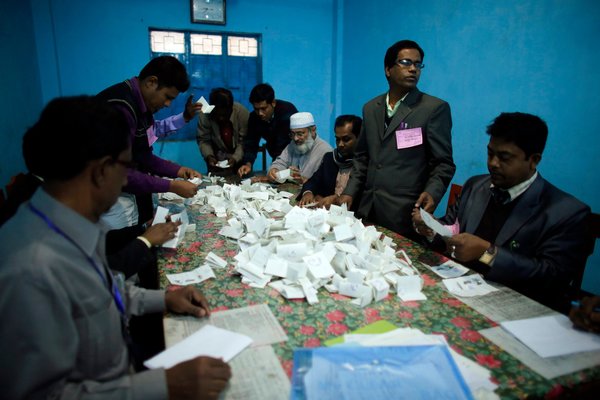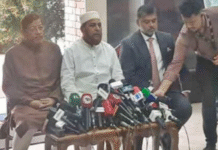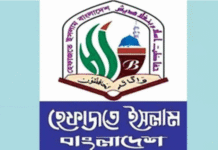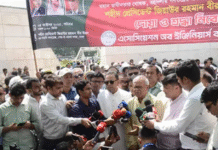By ELLEN BARRY
Bangladesh’s governing party celebrated its victory in general elections on Monday, dismissing critics who said the vote’s legitimacy was undercut by violence, low turnout and the absence of the country’s main opposition force from the ballots.
The party, the Awami League, won 232 of the 300 seats in Bangladesh’s new Parliament, about half of the victors unopposed. Partial results published by Bangladesh’s Election Commission put the average turnout on Sunday at 39.8 percent, though that figure appeared to have been padded by an influx of pro-government activists who arrived at polling stations shortly before they closed.
Prime Minister Sheikh Hasina, receiving journalists in her home on Monday, put the blame on the main opposition force, the Bangladesh National Party, which boycotted the election and carried out a campaign to discourage turnout. Some observers had hoped that the poor results would force the warring parties to negotiate a new, more inclusive round of elections. But Mrs. Hasina took a tough tone on Monday, saying she would not enter talks unless the opposition first renounced violence.
“Today, democracy is tainted by the blood of innocent people and soaked by the tears of burned people, who have fallen victim to the violent political program that is hitting the nation’s conscience,” she said. She added she had ordered the army to “curb any post-poll terrorism and violence with iron hands.”
At least 22 people were killed on Sunday, in some cases when police officers opened fire on opposition activists. Another seven people were killed in clashes on Monday, Bangladeshi news media reported.
After preventing it earlier, the authorities allowed a reporter from The New York Times to interview the opposition leader, Khaleda Zia, in the house where she has been confined since Dec. 29. Mrs. Zia called Sunday’s vote a “farcical election” and said she believed that turnout had been closer to 10 percent.
She said the Bangladesh National Party leaders were prepared to start negotiations immediately, after the government releases party workers who had been arrested in a pre-election crackdown. “Yes, we are ready to discuss, but first, they have to create a more congenial atmosphere” she said. “All the senior leaders, they are in jail. I have so many workers, they are in jail. Other senior leaders, they are in hiding. They have to clear the atmosphere.”
In the interview, Mrs. Zia also signaled some willingness to reconsider her party’s ties with the banned pro-Islamic party Jamaat-e-Islami, as the government has demanded. “With Jamaat, it’s not a permanent alliance,” she said. Asked if she could end it, she said, “At this moment, I cannot, but when the time will come I will see.”
The United States and Britain issued critical statements on Monday. A State Department spokeswoman, Marie Harf, urged both sides “to find a way to hold as soon as possible elections that are free, fair, peaceful and credible, reflecting the will of the Bangladeshi people.”
There was also some grumbling on the street. One of the country’s most popular newspapers, Prothom Alo, printed in Bengali, published the headline “Fake Vote, Disgraceful Election,” and an editorial cartoon showed Mrs. Hasina jubilantly running across a finish line while her rivals watched from a few feet away, tied to a tree.
“I am a citizen and voter of this country, and I have been deprived of voting, so I am not happy with these polls,” Mohammad Minhaz, 28, said. “I don’t think the newly elected government will be able to run the country smoothly for a long time.”
In 1996, it was the Awami League that boycotted elections being held by the Bangladesh National Party. The party went ahead with them, but turnout was extraordinarily low, and Mrs. Zia, under pressure, held a new round of elections four months later. Dan W. Mozena, the American ambassador in Dhaka, said he was convinced that a similar solution was within reach.
“This is a very sophisticated culture — they can devise quickly a way to weave themselves through this thicket so that they can come up with a way to hold free, fair, credible elections,” he said.
Julfikar Ali Manik contributed reporting.
Source: NYTimes










